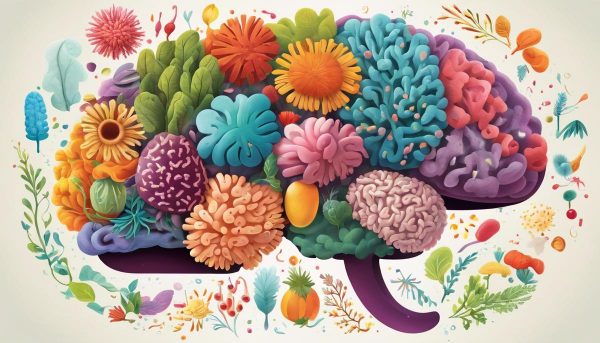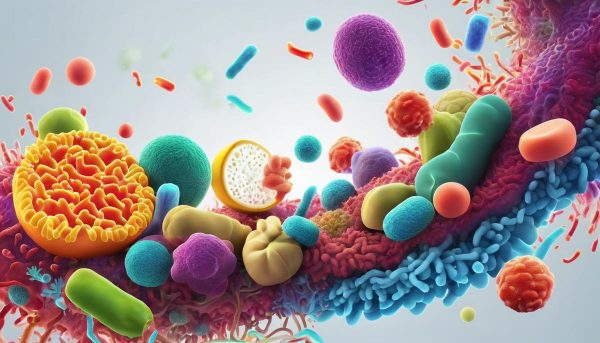Gut health, despite its often understated role, is a vital aspect of our overall wellness, intricately linked and influential to both our physical and mental health. Within the remarkable microcosm of our gut microbiome resides an immersive interplay of good bacteria and nutrients, silently shaping not only our physical stature but also our emotional and psychological state.
Understanding this fascinating network better can empower us to consciously make healthier lifestyle choices. This conversation unravels the critical aspects of gut health, the nuanced connection between the gut and the mind, and how this knowledge holds transformative potential for our family’s holistic well-being.
Understanding Gut Health
Delving into Gut Health: A Vital Component of Your Family’s Wellbeing
As parents, we certainly wear numerous hats – from chefs and chauffeurs to therapists and teachers, you name it. But, as we navigate through this beautiful chaos that is parenthood, there’s one particular hat that should never be taken off, and that’s our ‘health advocate’ hat. Today, we’ll be focusing on an aspect of health that perhaps doesn’t get the spotlight it deserves – gut health.
Gut health might sound slightly esoteric, lurking away in the shadows of mainstream health concerns. But trust this, it’s more crucial than you might initially presume and it plays a pivotal role in our family’s overall health. So, let’s break it down, see what it really is, and why it deserves your undivided attention.
When we speak about gut health, we’re referring to the status of our gastrointestinal (GI) tract, the wonderful long tube that delivers our food from entry to exit. This includes a host of organs – from the small and large intestine to the stomach and esophagus. A healthy gut is one that carries out its functions seamlessly and is also conducive to the growth of beneficial bacteria.
Deeper into this gut realm, there exists a complex community of more than 100 trillion microbiota (bacteria), making our gut virtually a bustling ‘microbial metropolis’. This gut microbiome helps digest food, protects against disease-causing pathogens, and plays a key role in maintaining our immune system. Quite fascinating, isn’t it?
Just as a balanced ecosystem implies harmony in nature, a balanced gut flora indicates a healthy body. On the contrary, an imbalance can wreak havoc in surprising ways, contributing to ailments like inflammatory bowel diseases, and obesity, and even impacting mental health.
Now, why should gut health command your attention as you nurture your family? Simple. It virtually touches every aspect of health. There’s a profound reason why the gut is often referred to as ‘the second brain’. It’s interconnected with our body in ways that influence not just digestion, but also mood, brain function, heart health, sleep pattern, and immunity, among others. In children, a healthy gut not only paves the way for optimal physical and cognitive growth but also lays a robust foundation for lifelong health.
The significance of maintaining gut health becomes even more paramount when you consider the trillions of bacteria and their genetic material living inside the human body! By taking care of our gut health, we’re facilitating our body’s fight against invaders, absorbing nutrients effectively, and even promoting better mental health.
But how do we ensure our family’s gut health remains tip-top? It’s actually simpler than it sounds. A diet rich in fiber (think fruits, vegetables, legumes, and whole grains), fermented foods, lean protein, and ample hydration does wonders for your gut. Prebiotics and probiotics are also your gut’s best friends, so make sure they’re included in your family’s diet.
In essence, just as you consider routine exercises or balanced meals non-negotiable for a healthy family, weaving in gut health into your family’s health plan is equally crucial. After all, a healthy gut quite literally means a healthier family. So, pull out your ‘health advocate’ hats, keep them on, and continue nurturing your beautiful family into the best health and happiness.
Link Between Gut Health and Mental Health
Extending from the very essence of what we just covered, let’s delve deeper into the profound linkage between gut health and our psychological well-being. You may be wondering, how is the state of our bellies interlinked with the functioning of our brains? Though these two parts of our bodies seem far apart, they are, indeed, functionally intertwined in fascinating ways.
Let’s first take a peek into a discovery known as the gut-brain axis, a term progressively making headlines in health journals. The gut-brain axis refers to the bidirectional communication between our digestive system and our brain. This is facilitated through various communication channels including the nervous system, immune system, and hormones. The star players creating the link in this axis are the trillions of microbes, collectively known as the gut microbiome.
Here’s a fun fact – there are more neurons in the human gut than in the entire spinal cord, which is why it’s often referred to as our “second brain”. This ‘second brain’ communicates with our actual brain, contributing significantly to our mood and mental health.
Emerging research indicates that an imbalance in gut microbiota could lead to mental health issues. This imbalance, or dysbiosis, has been linked to various psychological conditions like anxiety, depression, autism, and stress disorders. The gut microbes influence the production of neurotransmitters such as serotonin and dopamine, which impact our mood, anxiety, and happiness. A significant proportion, about 90% of serotonin, the ‘feel-good’ hormone, is actually produced in the gut!
Moreover, some studies point out that certain probiotics – dubbed psychobiotics – have the potential to alleviate symptoms of depression and other mental disorders. Sounds astonishing, doesn’t it? The thought of potentially dodging the grasp of depression through natural foods and supplements, simply by taking care of the gut, feels empowering.
Our childhood is the phase where the groundwork of our gut microbiome is laid. Poor nutrition and constant stress during this time can influence gut health and consequentially, mental health. So, fostering a healthy gut in youngsters isn’t just about taming that irritable bowel syndrome or warding off physical ailments, it can contribute positively towards their emotional resilience too.
To put things straightforwardly, nurture the gut, and the brain reaps the perks! Now, how can we positively influence our gut health for an exceptional mental health payoff? Consuming a diverse range of wholesome and nutrient-dense foods can significantly improve gut health. Include more fruits, vegetables, whole grains, and lean proteins in your meals. Foods rich in probiotics and fermented foods like yogurt, miso, kimchi, and kombucha are beneficial too.
Apart from the diet, regular exercise, adequate sleep, and managing stress through relaxation techniques like yoga, meditation, or simple deep breathing exercises can enhance gut health.
So, do we abandon conventional mental health treatments and therapies? Absolutely not! These are still primary and crucial. But understanding the gut-brain connection, appreciating the importance of our gut health, and making proactive lifestyle changes can surely complement those treatments and lead us on a path to optimal mental health. In the pursuit of mental health, every bit of self-care counts, and the gut is an excellent place to start!
So, embrace the power of the gut, dear friends, and let’s create a nourishing environment for our posterity. Let’s start listening to those gut feelings, shall we?
Real-life Implications on Family Well-being
Oh, the marvelous world of our gut is truly an unsung hero, isn’t it? Let’s dive further into the deep connection between a healthy gut and a healthy mind. This is where the magic of gut health truly unfolds!
Often heard but seldom explored, the concept of the gut-brain axis has started to garner much attention in the realm of health sciences. It’s a powerful two-way communication system between our gut and our brain. What’s astonishing is our gut microbiome’s role in this. These trillions of microbes universally affect our mental health, influencing our behaviors, emotions, and perceptions.
Now you may be wondering, “How can tiny gut bacteria affect our brain?” This is where it gets interesting. Researchers have discovered that an imbalance in gut bacteria can seriously affect mental health. This is because our small but mighty gut microbes are responsible for producing about 90% of the body’s serotonin, a vital neurotransmitter that regulates our mood.
Therein comes the concept of ‘psychobiotics’ – a revolution in the realm of mental health. Psychobiotics are essentially ‘mind-influencing microbes’. They have the potential to alleviate symptoms of various mental health disorders like anxiety, depression, stress, and potentially much more. But please remember, that incorporating psychobiotics does not mean ditching conventional mental health treatments. Think of them as teammates, working hand-in-hand to boost mental health.
Little ones definitely aren’t left out of this equation. During childhood, fostering a healthy gut can build emotional resilience, setting the stage for positive mental health as they grow. This is a fantastic opportunity to set our kiddos on the path to holistic health and wellness, starting with their gut.
“But how to nurture our gut health?” You may ask. This can be achieved through a diversity of nutrient-dense foods that work in collaboration to give your gut flora the richest possible environment to thrive. Fermented foods like yogurt and sauerkraut can be a game-changer too, offering a direct dose of beneficial bacteria.
And let’s not forget probiotics, these friendly bacteria can be a powerful ally when supported by prebiotics – the dietary fiber that acts as food for them. Indeed, a gut-friendly diet is essential, but the positive influence doesn’t stop there.
Physical activity has also been shown to favorably alter gut microbiota, offering us another reason to get our bodies moving. No less important are adequate quality sleep and stress management, both impacting the gut ecosystem profoundly and therefore crucial to maintaining gut-brain harmony.
Isn’t it astonishing how versatile our gut is? With such immense influence over our mental health and overall well-being, prioritizing gut health becomes more than a choice; it’s essential. By embracing gut-friendly habits, we can support our families on the journey to elevated wellness. So, let’s treat our gut as our second brain – for a future that’s both healthier and happier!
Incorporating Gut Health Measures into Family Lifestyle
Elevating Your Family’s Health: Steps to Enhance Gut and Mental Well-being
There’s a familiar saying in health circles—your gut is your “second brain.” This isn’t just a catchy phrase but stems from research that explores the relationship between gut health and mental health. Having covered the rudiments of gut health and its broad-reaching implications in the previous sections, the focus now turns to simple lifestyle changes to enhance gut functions and, by extension, mental health.
Integrating these small tweaks into your family’s routines won’t feel like an overwhelming task. Instead, they’re likely to spur a joyful journey towards better health and a more balanced life.
Incorporate Mindful Eating
Mindful eating offers a two-fold advantage – it encourages healthier food choices and reduces stress, a well-known gut disruptor. It’s an easy shift to make. Make mealtime a focused activity – turn off the television, put down the smartphones, and emphasize the family enjoying the meal together. Studies show that slower, more mindful eating supports digestion, giving gut flora the opportunity to properly process the meal.
Restrict or Lower Antibiotic use
An essential step in enhancing gut health is understanding that while antibiotics are sometimes necessary, they can disrupt the gut flora balance, leading to potential mental health implications. If antibiotics are unavoidable, consider a prescribed course of probiotics to restore the gut balance.
Exercise as a Family
Another robust way to promote a healthier gut microbiome is through frequent exercise. Family bike rides, hikes, or simply enjoying the local park are all good options. Current research already highlights the connection between exercise and the diversity and abundance of the gut microbiome. Even better, exercise is also directly linked to improved mental health.
Prioritize Sleep
Sufficient, good-quality sleep is instrumental in gut health. In children, it is indispensable. The disruption of the sleep cycle has been linked with an altered gut microbiome, which contributes to conditions such as obesity and depression. Simple adjustments, such as adhering to a strict bedtime schedule and ensuring bedrooms are conducive to relaxation, can play a big part in improving family sleep health.
Opt for Whole Foods
While we’ve touched on the importance of a balanced diet, it’s worth repeating. Make the switch from processed to whole foods where possible. Whole grains, fruits, and vegetables maintain a healthy gut flora, reinforcing the gut and mental health connection.
Creating a Tranquil Environment
Lastly, remember the implications of stress on both gut and mental health. Cultivate an environment where open communication is encouraged, activities to reduce stress are promoted, and the mindset of maintaining good health is nurtured.
These simple lifestyle modifications within your family’s routine can lead to enhanced gut health and, in turn, improved mental wellness. Making these small changes can lead to significant benefits, creating a happier, healthier family environment that supports each person’s mental and physical well-being.
The journey towards a healthier family lifestyle begins by bridging the gap between our understanding of gut and mental health. As this narrative shows, small shifts such as embracing better meal planning, instilling regular exercise habits, reinforcing hydration, and ensuring adequate sleep can make a significant difference, both figuratively and literally, in our gut and mental well-being.
Remember, gut health isn’t just about what we eat; it’s also about how we live, feel, and interact. By proactively prioritizing these vital aspects of health, we can bolster our physiological resiliency and mental fortitude, ultimately shaping a healthier, happier future for our loved ones.



